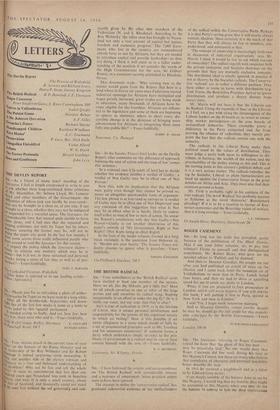SIR, -1 have followed the articles and correspondence on 'The British
Radical' with considerable interest and a measure of amusement. Some practical points seem to have been ignored.
The attempt to define the 'conservative radical' has produced substantial evidence of the ineffectiveness of the radical within the Conservative Party. Perhaps it is that Party's saving grace that it will nearly alwayk contain idealists. Most certainly it is the mark of that Party that they will always be few in numbers, mis- understood, and mistrusted at that.
'The concept of ownership is increasingly irrelevant in discussion of industrial organisation,' says Mr. Marris. I think it would be fair to ask which concept of ownership? The radical regards with suspicion both the private enterprise and Socialist doctrines on the grounds that they are mutually exclusive concepts. The distributist ideal is wholly ignored, in practice if not in theory, by the Socialist radicals. The Conserva- tive 'radicals' are in rather a different position. They have either to come to terms with distributism (e.g. Unit Trusts, the Restrictive Practices Act) or to ignore distributism and produce a theory distinct from laissez-faire.
.Mr. Marris will not have it that the Liberals can be Radical. Citing the example of Suez at the Liberals is, I feel, on a par with citing the intransigency of the Labour leaders on the H-bomb or, to revert to owner- ship, worker participation on the area boards of nationalised industries. These examples prove a deficiency in the Party concerned and, far from proving the absence of radicalism, they merely pin- point the fact that the radicals remain one with the minority.
The radicals in the Liberal Party make their political stand by the values of distributism. They must judge a party both upon its willingness to dis- tribute, in fairness, the wealth of the nation, and the practicability of the policy aiming at this end. This is the turning point in this century's political debate and it is a very serious matter. The radicals (whether the tag be Socialist, Liberal or plain humanitarian) are lined up against the Conservative forces in the great debates on Africa and Asia. They must also find their common ground at home.
Mr. Firth is probably right in his estimate of the true radicals. The word 'Radical' has probably become as flyblown as the word 'democrat.' Reactionary pleading? If it is to be a reaction in favour of Key- nesian economics and the Beveridge vision of welfare, then it is long overdue.—Yours faithfully,
63, Austin Drive, Didsbury, Manchester 20


































 Previous page
Previous page